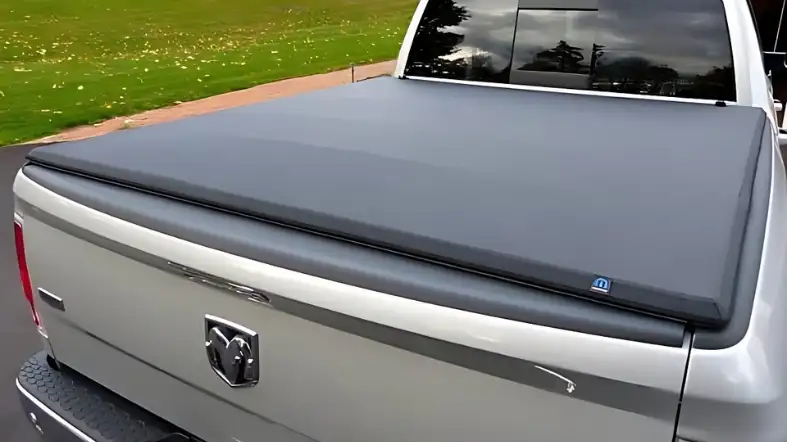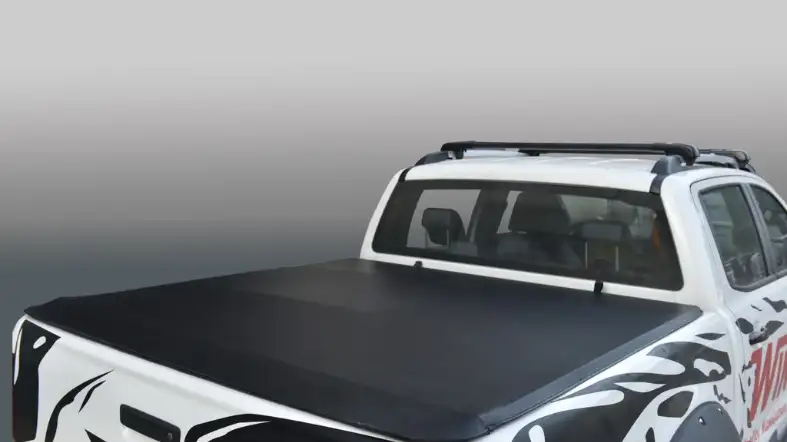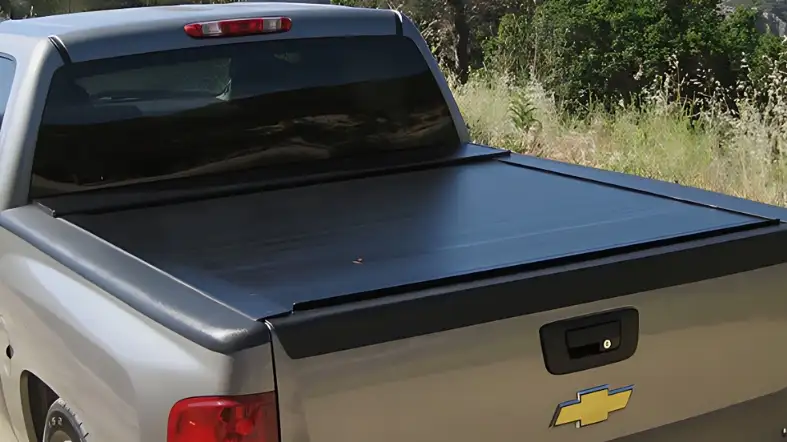Are you considering purchasing a tonneau cover for your truck? One important factor to consider is whether tonneau covers have the flexibility to stretch.
When it comes to protecting your cargo from the elements and enhancing your truck’s aesthetics, the ability of a tonneau cover to stretch can be crucial.
In this article, we will delve into the question, “Do tonneau covers stretch?”
We will explore the functionality, benefits, and factors affecting the stretchability of tonneau covers.
We will also provide you with valuable insights to make an informed decision.

Do tonneau covers stretch?
Yes, tonneau covers can stretch. They are designed to provide a snug and secure fit over your truck bed.
The stretchability allows them to accommodate different bed sizes and shapes, ensuring a tight seal to protect your cargo from the elements.
Factors That Affect the Stretchability of Tonneau Covers
These are the factors that affect the stretchability of Tonneau Covers:
Material Composition
The type of material used in tonneau covers can significantly impact their stretchability.
Soft roll-up covers, typically made of vinyl or fabric, offer more flexibility and stretchability compared to hard folding covers, which are constructed from rigid materials like aluminum.
Mounting Mechanism
The way a tonneau cover is mounted onto the truck bed can influence its stretchability.
Covers that utilize a clamp or rail system provide adjustable tension, allowing for better stretching and fitting to different bed sizes.
Weather Conditions
Extreme temperatures and weather conditions can affect the stretchability of tonneau covers.
In cold weather, some covers may become less flexible, making them more challenging to stretch and secure properly.
Age and Usage
Over time, tonneau covers may experience wear and tear, which can affect their stretchability.
Frequent usage and exposure to harsh elements may cause materials to become less elastic, reducing the overall stretch capacity.
Bed Shape and Size
The dimensions and contours of your truck bed play a role in the stretchability of tonneau covers.
Some covers are designed to accommodate specific bed sizes and shapes, while others offer adjustability to fit various configurations.
Installation Technique
Proper installation is crucial for optimizing the stretchability of tonneau covers.
Following the manufacturer’s instructions and ensuring a secure and even fit will help maximize the cover’s ability to stretch and conform to the truck bed.
Maintenance and Care
Regular maintenance and care can also impact the stretchability of tonneau covers.
Cleaning the cover with appropriate products and avoiding harsh chemicals or abrasive cleaning methods can help preserve the cover’s elasticity and overall stretchability.
How to know if your cover needs to be stretched?

Assess the Fit
Start by examining the fit of your tonneau cover on your truck bed. Look for any sagging or looseness in the cover material.
If you notice significant gaps or wrinkles, it may be an indication that your cover needs to be stretched for a tighter fit.
Check for Water Leakage
Inspect your truck bed after rainfall or by spraying water onto the cover.
If you find water pooling or leaking into the bed, it suggests that the cover is not stretched enough to create a proper seal.
Water leakage indicates the need for stretching to enhance the cover’s ability to protect your cargo from water damage.
Evaluate Tension and Tightness
Feel the tension and tightness of the cover by pressing down on different areas.
A properly stretched cover should feel firm and secure, without any excessive give or movement.
If you notice areas that are too loose or easily moveable, it is a sign that stretching is required to achieve the desired fit.
Look for Flapping or Fluttering
When driving at higher speeds, observe the behavior of your tonneau cover.
If you notice significant flapping or fluttering of the cover material, it indicates that the cover is not adequately stretched.
This movement can cause strain on the cover and reduce its effectiveness in protecting your cargo.
Check for Wear and Tear
Regularly inspect the cover for any signs of wear and tear, such as fraying edges or stretched-out sections.
Over time, tonneau covers may lose their elasticity, resulting in a loose fit.
If you notice significant wear or stretching, stretching the cover may help restore its original fit and functionality.
Consider Temperature Effects
Extreme temperatures can affect the elasticity of tonneau covers. In colder climates, covers may become less flexible, leading to a loss of stretchability.
If you experience difficulties in stretching your cover during colder weather, it may be necessary to warm the material slightly to improve its flexibility.
Consult Manufacturer Guidelines
Refer to the manufacturer’s guidelines or instructions specific to your tonneau cover.
They may provide recommendations on how often the cover should be stretched or offer instructions on how to stretch it properly.
Following the manufacturer’s recommendations will ensure you maintain the cover’s optimal performance.
How to stretch a tonneau cover?

Step 1: Prepare the Cover
To begin stretching your tonneau cover, ensure that it is clean and free from debris.
Remove any objects or cargo from the truck bed to create a clear working area. This will allow you to focus on stretching the cover effectively.
Step 2: Identify Attachment Points
Identify the attachment points of your tonneau cover, such as clamps, snaps, or rails. These are the areas where the cover is secured to the truck bed.
Understanding the attachment points will help you determine where to apply tension during the stretching process.
Step 3: Loosen Attachment Mechanisms
If your cover uses clamps or similar mechanisms for attachment, loosen them to provide flexibility.
This will make it easier to stretch the cover and ensure a snug fit. Loosening the attachment mechanisms will allow you to manipulate the cover as needed.
Step 4: Begin Stretching
Starting from one end of the cover, gently pull and stretch the material towards the opposite end.
Apply even pressure along the length of the cover, working your way from one attachment point to the next.
Keep in mind that you should not overstretch the material, as it may lead to damage or an improper fit.
Step 5: Check for Tightness
Periodically check the tightness of the cover as you stretch it. Ensure that the material is snug and taut, without any significant sagging or loose areas.
Adjust the tension as necessary, focusing on achieving an even stretch throughout the cover.
Step 6: Secure Attachment Points
Once you have stretched the cover to your desired level of tightness, secure the attachment points.
Tighten the clamps, snaps, or rails, ensuring that the cover remains in its stretched position.
Double-check that the cover is properly aligned and centered on the truck bed.
Step 7: Test for Fit and Functionality
After stretching and securing the cover, test its fit and functionality. Close and open the cover to ensure it operates smoothly and without any issues.
Check for proper sealing to protect your cargo from water and other elements.
Benefits of Stretchable Tonneau Covers

Enhancing your truck with a tonneau cover offers a range of advantages, and when it comes to choosing the right cover, stretchable tonneau covers come with their own unique benefits. Let’s explore why stretchable tonneau covers can be
an excellent choice for your truck.
Versatile Fit
With their flexible materials, stretchable tonneau covers can accommodate different truck bed sizes and shapes.
Whether you have a compact truck or a full-size pickup, a stretchable cover can provide a snug and secure fit, protecting your cargo from the elements and preventing shifting during transportation.
Easy Installation
Stretchable covers are designed for user-friendly installation.
Their flexibility allows for effortless adjustment and tightening, ensuring a proper fit without the need for complex tools or extensive effort.
You can save time and have your cover securely installed in no time.
Weather Protection
The stretchable materials used in these covers often offer excellent weather resistance.
They can shield your cargo from rain, snow, UV rays, and other environmental elements.
Whether you’re transporting equipment, supplies, or personal belongings, a stretchable tonneau cover will help keep them dry and protected.
Improved Security
The tight fit achieved by stretchable tonneau covers enhances the security of your cargo.
It prevents prying eyes from easily accessing and stealing your belongings.
Additionally, a securely covered truck bed deters potential theft and ensures that your items remain safe during travel.
Enhanced Fuel Efficiency
By reducing wind drag, stretchable tonneau covers can contribute to improved fuel efficiency.
The aerodynamic design created by the snug fit helps streamline airflow, reducing resistance and enabling your truck to move more efficiently.
This can result in savings at the gas pump, especially during long trips or highway driving.
Customized Style
Stretchable tonneau covers often provide a sleek and streamlined appearance for your truck.
They can complement its overall aesthetic and enhance its visual appeal.
Whether you prefer a low-profile roll-up cover or a tri-fold design, stretchable covers offer various options to match your style preferences.
Increased Storage Options
Stretchable tonneau covers give you the flexibility to transport taller or bulkier items in your truck bed.
By adjusting the cover’s tension or rolling it up partially or fully, you can create additional vertical space and accommodate larger cargo that would otherwise be limited by a fixed cover.
Will a Tonneau Cover Stretch to Fit Different Truck Models?
Tonneau cover compatibility explored: Many truck owners wonder if a tonneau cover is suitable for different truck models. Fortunately, tonneau covers are designed to stretch and fit various truck sizes and shapes. With adjustable features, these covers can provide a snug and secure fit, ensuring protection and functionality for different truck models without compromising their quality.
FAQs
How Much Can A Tonneau Cover Stretch?
The stretchability of tonneau covers varies depending on the material and design.
Some covers offer more flexibility and can stretch to accommodate different bed sizes.
Why Is Stretchability Important In Tonneau Covers?
Stretchability ensures a tight fit, which helps protect your cargo from the elements and prevents shifting during transportation.
It also contributes to the overall security and effectiveness of the cover.
Can A Tonneau Cover Lose Its Stretch Over Time?
Over time, tonneau covers may experience wear and tear, which can affect their stretchability.
Frequent usage and exposure to harsh elements may cause the materials to become less elastic.
Are There Different Types Of Tonneau Covers With Varying Levels Of Stretchability?
Yes, there are different types of tonneau covers, including soft roll-up covers and hard folding covers.
Soft covers made of vinyl or fabric generally offer more stretchability compared to rigid covers.
Can I Stretch A Tonneau Cover Myself?
Stretching a tonneau cover typically involves adjusting the tension and ensuring a proper fit during installation.
It is recommended to follow the manufacturer’s guidelines and instructions for stretching the specific cover.
How Often Should I Stretch My Tonneau Cover?
The need for stretching your tonneau cover will depend on various factors such as usage, weather conditions, and the material of the cover.
Regular maintenance and inspection will help you determine if stretching is necessary to maintain a proper fit.
Final Words
Experience the versatility and functionality of tonneau covers that can stretch to accommodate your specific truck bed size and shape.
With the ability to provide a snug and secure fit, these covers protect your cargo from the elements and ensure its safety during transportation.
Whether you choose a soft roll-up cover or a hard folding option, the stretchability of tonneau covers offers a customizable solution for your truck.
